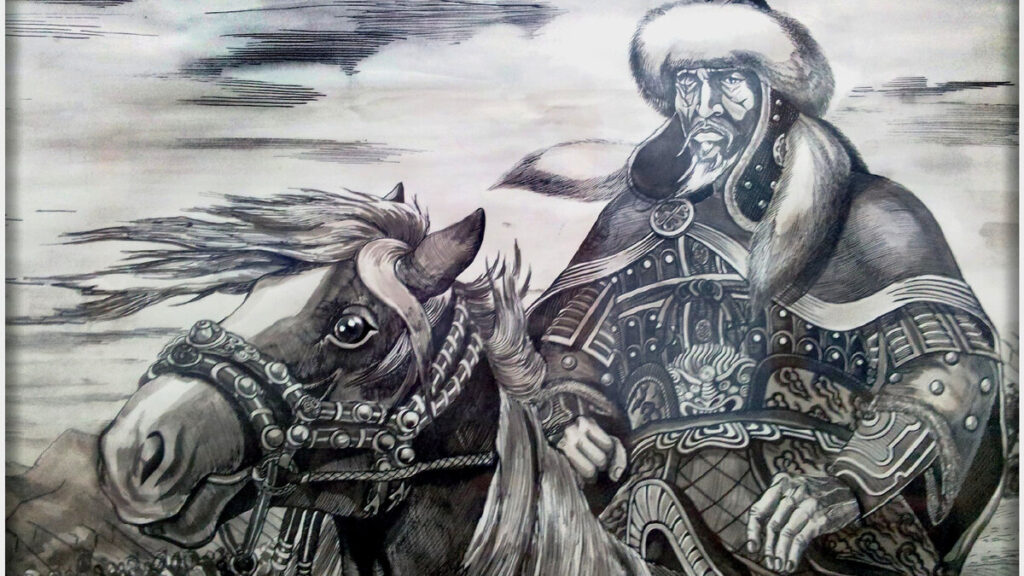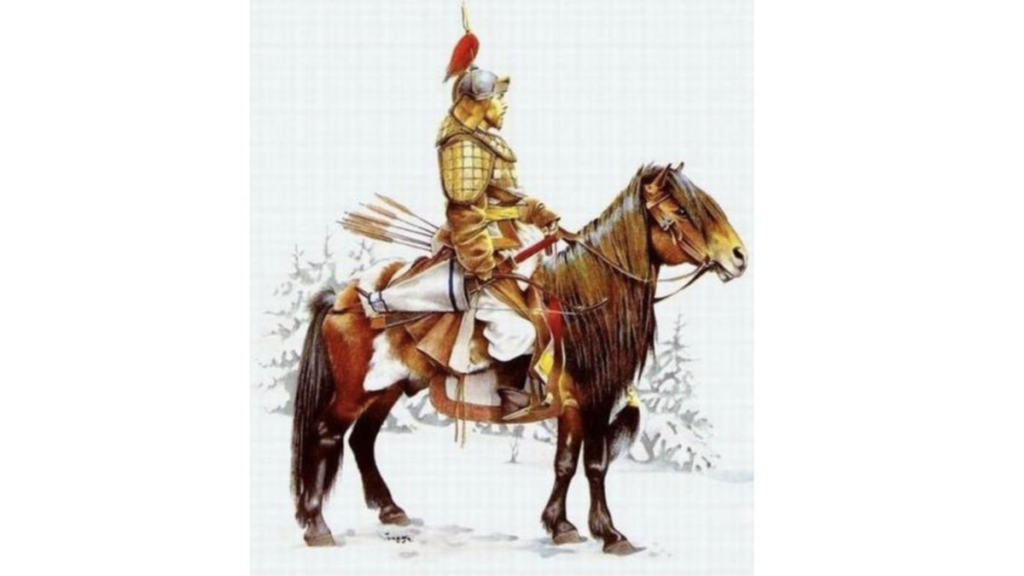The campaign of Genghis Khan’s tumen Dzhebe and Subudei began rather as a reconnaissance — police operation during the war with the state of Khorezm Shahs.
More details about Genghis Khan’s war against Great Khorezm can be found here:

Subuday
Today I will tell about the only, at the time of Genghis Khan’s life, clash of the Mongol army with Russia. Read the article to the end, and you will learn why army of Russia on Kalka was doomed and catastrophe is inevitable.
The beginning of a campaign
In 1220, after falling of Samarkand war with Khorezm has been won by Mongols. The main cities were taken or besieged, the armies of Khorezm were defeated, and the ruler — Khorezm Shah Mekhammed II was hiding somewhere with a small detachment.
For his pursuit, and at the same time for «cleaning up» still resisting was created a special corps consisting of 3 tumens (corps, formally numbering 10 000 people each) under the command of Subudei bagatur, Dzhebe noyon (the best generals of the Mongols), and the third commanded by Genghis Khan’s son-in-law — Tokhuchar.
I would like to say a few words about the latter. There is some strangeness with him in the sources. He is there, he is mentioned everywhere. Then he enters into battle with the city that has expressed obedience to Genghis Khan (to whom it is interesting — it was Merv).
Then he disappears everywhere. Some say that he died in battle, but the death of Mongol commanders at that time is exceptional. They exactly POLKOVODTS and fight not with swords, as their European colleagues, and warriors. So they were behind their troops and could die only in case of total defeat. I emphasize, not defeat, but defeat, about which there is no mention.
The answer to what happened (much more plausible) is given by other surviving sources. For the attack on the city that accepted the power of the Mongols, Tohuchar was summoned to Genghis Khan and executed. There is nothing to meddle in big politics. The case in itself is unimportant, but it will be important in the article where I will tell about the reasons of continuous victories of the Mongols and about the structure of their state.

Presumably Tohuchar
Let’s return to our heroes Djebe and Subudei. They were left alone. For some time they ran around Transcaucasia, trying to find traces of fleeing Khorezm Shah. At the same time they captured cities if they resisted (Kazvin) or imposed tribute if they submitted (Tabriz) and genocided rebels. That’s what military police tasks are all about.
But about this time they received the news that the goal of their campaign — Mohammed «ceased to exist», and his son Jalal ad Din fled to southern Iran.
Remembering the fate of Tohuchar, the tumniks (the highest rank of the Mongols, the chief of the tumen) did not become amateurish and contacted Genghis Khan, saying so and so, we are at war, there is no enemy anymore, what to do next?
Change of plans
The Great Khan assessed the situation. Khorezm was destroyed, its capital Urgench was about to fall or had already fallen. It is necessary to think about new conquests. And here it turned out that the peoples that Mongols know well are coming to an end. Next in line is the west or «evening countries», as the Mongols themselves called them.
There’s a minimum of knowledge about them. Of course, they have heard some things. Mongols in general were the first since antiquity who organized proper intelligence. Both tactical (by special groups of scouts) and strategic (mainly through merchants).
But a merchant is a merchant. He understands in resources of the country, trade, something can hear about a military machine, but to imagine military potential of the state is not able. Therefore, a Russian druzhinnik or a European knight for the horde, which a few years before that was at war with China!!! is a phenomenon of little comprehension. Genghis Khan did not like such «incomprehensibility» much.
All the stars aligned. On the southern spurs of the Caucasus there is a strong corps under the command of excellent commanders, which, in fact, has nothing to do. The conclusion is self-evident. Send them across the Caucasus to «see what’s what?».
At the end of 1221 (or the beginning of 1222) the Mongols overcame the Caucasus Range through the Derbent Passage. It seemed that what could go wrong? But they were met by a strong alliance of Alans (ancestors of modern Ossetians) and Kipchaks, who are already definitely our «native» Polovtsians.
Their khans at that time were named Danilo Kobyakovich and Yuri Konchakovich. The Alanian army with reliance on nomadic cavalry was for Dzhebe and Subudei clearly «not on a shoulder». But unlike Tohuchar, these two could «in politics» not worse than Genghis Khan.
Presumably Djebe
Dzhebe and Subudei conspired with Kipchaks, provided their neutrality and the state of Alans was defeated. After that, Kipchaks have undergone powerful and most likely treacherous attack. (they were not under the protection of Genghis Khan as Merv).
In any case, and the Polovtsian Khan Yuri and Khan Danilo died at this time, and the defeated Kipchaks began to rapidly roll back to the Dnieper. So for one short company Mongols became the dominant force in the North Caucasus, and in the South Russian steppes.
Embassies from the Cumans hordes came to the cities of Rus with requests for help and the offer of an alliance on any terms.
And Kotyan, prince of the Cumans, with other princes and with the rest of Polovetses have run to that place that is called a shaft of Polovetses, and other Polovetses many have run away to the Russian land. This Kotyan was father-in-law to Mstislav Mstislavich Galitsky. And it has come with Princes Cumans to Galich with a bow to Prince Mstislav, to the son-in-law, and to all Princes Russian. And he brought many gifts — horses, and camels, and buffaloes, and slave girls; and he gifted the Russian princes, and said so: «Our land was taken away by the Tatars today, and yours will be taken tomorrow. Come, defend us. If you do not help us, we will be cut down today, and you tomorrow»
Rus had already heard of a new threat coming from the depths of Asia and sweeping away everything on its way. Prince of Kiev, traditionally considered the leader of Russian lands, but in fact he has not been for a long time — Mstislav the Old declared:
As long as I am in Kiev — on this side of the Yaik, and the Pontic Sea, and the Danube River do not wave the Tatar saber.
Later the chronicler will recall to him these words …
Disaster on Kalka
The princely congress was gathered and the decision was made: with all possible haste to collect the army and go to the aid of the Polovtsians. The result was the battle of Kalka. The battle itself is sorted out many times, I do not want to repeat, so I will stop only on the reasons of defeat of Russian armies. About reasons of victories of Mongols will tell in the separate article.
Battle of Kalka
As it will not seem strange, but defenselessness of Russian lands before a new threat is due to the fact that the Old Russian state was … the most developed of all in the region and furthest into «advanced feudalism».
The armed forces made a clear choice in favor of quality over quantity (exactly like the European knights). Well and certainly, full absence of uniform command as feudal fragmentation.
In the beginning of 13 century Russian druzhinnik — one of the strongest warriors of the world. It is perfectly armed, armored and trained, sits on a fine horse and in general a bogatyr, but … the average druzhina of an average prince is 200 men. There is still true the so-called «city regiments», but it is exactly the same heavy cavalry, as in the druzhiny only in the service of the city, not the prince. Approximately in the same quantities. The time of tribal militias and other mass contingents was gone.
But even this was not the main trouble of the Old Russian army in the 13th century. If 20 princes gathered and agreed on joint actions (which happened), the result was not a joint corps of 4000 people, as in the same Mongols, and 20 detachments of 200 soldiers.
That is fully disclosed in the disaster at Kalka. In sources there are a lot of descriptions of feats of separate princes at the head of the vigilantes and no unanimity and interaction. Alas. And what unanimity if the senior of princes — Mstivlav of Kiev in general «did not appear at war». He stayed in his fortified camp, as he was «treated without respect». Before the organization and order of the Mongolian army, Russia was defenseless.
Subudei with Dzhebe did not begin to invade in the lands of Russia itself, and have turned to the north-east to Volga Bulgaria. And here there was a «misfire». Not being so fragmented as Russia, Bulgaria (as well as Alania before that) could collect considerable forces and has made the best commanders of Genghis Khan serious defeat. In different sources it is spoken, that Mongols or have lost 4000 soldiers or 4000 from two tumen only and remained. Then the remnants of the corps moved south and joined the main forces. The campaign of Djebe and Subudei is over. Our story for today is also over.
